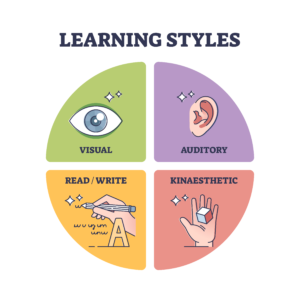Physical Address
304 North Cardinal St.
Dorchester Center, MA 02124
Physical Address
304 North Cardinal St.
Dorchester Center, MA 02124

In the fast-paced world of today, it’s essential to learn how to master any subject quickly and efficiently. Whether you’re looking to pick up a new skill or simply want to become an expert in a certain area, there are some simple ways that you can use to help achieve your learning goals faster. In this article, we’ll provide five effective strategies that you can use to learn anything faster.
It is important to note that learning is a process and it should not be rushed. For example, the pleasure of reading comes from taking your time with each page, allowing yourself to take breaks between chapters if needed, or revisiting previous passages if something stood out as particularly important or interesting. Doing this also encourages active learning rather than passive consumption of text which can lead to better comprehension and knowledge retention after finishing a book. The following steps are meant to teach you better ways you can retain this knowledge and help you absorb as much material as you can.
“Give me six hours to chop down a tree and I will spend the first four sharpening the axe”
-Abraham Lincoln
The famous quote by Abraham Lincoln, “Give me six hours to chop down a tree and I will spend the first four sharpening the axe” is one of the most popularly cited phrases when it comes to learning. The message here is that in order to be successful in any task, we need to invest time and effort into understanding how to do it properly before we start doing it. Learning effectively requires knowing how to learn – an important skill that many of us lack.
One of the key parts of learning is understanding our own personal learning style and preferences. There are many scientific ways to learn and taking some time to reflect on your own approach and find out what works best for you can help you become more knowledgeable and proficient in a much shorter amount of time. A lot of us like to cram as much information as possible the night before an exam, but this might not be the best way to do it. The idea here is to actually learn and improve your memory, so take the time you need to understand the process of learning in order to improve your ability to learn.
There are four main types of learning styles: visual, auditory, read/write and kinesthetic. Each style is unique and offers its own advantages in the classroom setting.

Each learning style has its own strengths and weaknesses that must be taken into account by educators when constructing curriculums for their students.
Do you know what your learning style is?
The average person is interrupted every three minutes while they are trying to focus on a task.
Interruptions and distractions can have a major impact on our day-to-day tasks, leading to lost time and productivity. According to research, it takes an average of 23 minutes and 15 seconds for someone to get back to the original task after being disturbed by an interruption. This lost time can add up quickly and make it difficult for us to achieve our goals. To help increase effective learning, we need look no further than making sure distractions are minimized at least two or three times a week.
If we ensure that interruptions do not occur during this time, we can learn faster and remember better because there will be fewer distractions. Additionally, taking regular breaks throughout the day is important in order to stay focused on tasks at hand and prevent fatigue from setting in. After all, we do want to learn new knowledge and by having uninterrupted practice sessions we can achieve so much more.
Taking notes when trying to learn something can be one of the best ways to learn and help yourself understand, memorize and retain the material. It doesn’t matter if you take notes by hand or notes on a laptop, but taking notes can prove beneficial in a variety of ways when we are trying to learn a new subject. Not only does it provide you an opportunity to engage with the material by writing down word for word what you are learning, but also it gives the brain some time to organize information and learn more efficiently
For those who take notes while studying, they will be able to recall information much more easily than those who don’t due to having written reminders of what they have learned. Taking notes allows us to better process, understand, store and retrieve content which all contribute to our ability to remember facts for longer periods of time. Additionally, taking notes can help the brain make stronger connections between newly acquired knowledge and existing long-term memory which helps with memorization in the long run.
When it comes to learning something new, it is important to practice retention and put what you have recently learned into action. Knowing the theories behind a concept or skill can be beneficial, but true understanding of something requires putting it into practice. Testing yourself or having a study session is an effective way to gauge how much new information you have truly retained and comprehended. It should not be easy; in fact, if it is to simple then chances are you are not pushing yourself enough. Make sure that your test covers every aspect of what you have been studying so that there will be no surprises when presented with more difficult questions later on down the road.
It is important to remember that learning any new concept or skill can take time and patience in order for one to achieve mastery.
Studying in the same room that you will take a test can be incredibly beneficial for students. Not only does this provide familiarity with your surroundings, it also aids in recalling important information during the exam.
Research has shown that when you are surrounded by familiar objects, people and places; this helps to form strong connections in the brain cells which allows for easier recall of information. It is almost as if you “immerse” yourself into the learning process so that those associations become stronger. This way, when taking a test or exam, your brain will be able to draw on these connections to help answer questions correctly.
The best way to use this technique is to make sure you study in the same place where you will take the test – preferably near some of the same objects or furniture that were present during your studies.
Teaching what you know is a great way to remember and learn more. You’ll be able to gain new insights and understanding into the subject matter as you explain it. This learning technique will help you learn faster, retain more information, and increase your confidence in teaching others.
The process of teaching your knowledge will also help you review your own understanding of the material. Through this practice, you’ll be able to identify any gaps in your own knowledge and fill them with additional research or learning opportunities. Teaching what you know will give you the opportunity to stay up-to-date on a particular topic while gaining valuable experience delivering instruction.
By taking advantage of this method of learning, you’ll be able to improve upon your skillset while helping others understand complex topics better.
In conclusion, unlocking your potential and learning how to learn faster and retain the information is key to success. By taking the time to understand these key points of eliminating distractions, taking notes, practicing retention and immersing yourself in what you are learning, you can maximize your potential and achieve more. These are all ways to learn faster and learn quickly. It may seem like a daunting task to learn a new language or trying to remember a certain subject at first but with dedication and perseverance, you will be sure to succeed. Why not start today by trying out some of these simple tips? Take control of your learning journey and unlock your potential.
Learning is a vital part of life and every individual learns differently. There are four main types of learning styles that can help people identify how they learn best: visual, auditory, read/write and kinesthetic. Visual learners prefer to be shown information through diagrams, videos or images. Auditory learners learn best when they hear the information and use verbal discussion to understand it better. Read/write learners excel when given written material such as textbooks or notes that they can follow along with or review at a later date. Lastly, kinesthetic learners gain knowledge by participating in activities such as experiments, role play or physical activity.
No matter which type of learner you may be, it’s important to recognize what works best for you so that you can maximize your learning capabilities in any environment.